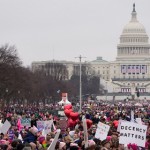A speaker at a function last week in Singapore told the audience that America had excellent universities and think tanks–and yet, it had elected Donald Trump as its President. I have argued in the past that America needs a Trump presidency–to rediscover itself. Perhaps, what we are now witnessing is that painful process of rediscovery. The second time I wrote about him was on the morning of November 8, to endorse him for the Presidency.
The London-based Financial Times carried a brief story on emerging job losses in the retail sector in America, dwelling on e-commerce, automation, the evisceration of urban life–but invoking the president’s name 15 times in a painstaking and pathetic attempt to pin the job losses on him and blaming him for not paying attention to the training of wind turbine technicians!
In contrast, since December, the unemployment rate among white men has fallen sharply. So has it among workers with a high school diploma or less too. Small businesses create nearly half the jobs in the non-farm economy in America. Their sentiment languished at slightly above recession levels throughout the Obama presidency. In November, the sentiment index jumped higher sharply and it has stayed there since. Job openings in small businesses have spurted and their hiring plans are now elevated.
In financial markets, data shows that net inflows into US domestic equity funds (mutual funds and exchange-traded funds) in the United States turned positive in November. It has remained positive in the subsequent four months. In the previous 22 months, only five saw net positive flows and, in three of them, the amounts were negligible. It is also a fact that stock prices did not collapse nor did bond yields climb after Trump took office. Indeed, financial markets had a rare meltdown day the day his troubles deepened recently. For the most part, American media does not report these stories let alone reflect on them.
Clearly, the President has not been the fascist dictator that he was widely made out to be. His travel ban was clumsily executed but it has now amounted to extreme vetting, almost similar to what was in practice under his predecessor. His rescinding of the Trans Pacific Partnership was perhaps a strategic mistake, but most are not bothered about it. He did not withdraw from the North Atlantic Free Trade Agreement. The border wall is not coming up nor is the Border Adjustment Tax on the front burner. He is trying to do business with China. In other words, his policy bite has been far weaker than his policy bark. So, why is there such a visceral hatred of the President?
His opponents–Democrats, Republicans, sections of the media and academics–did not anticipate his arrival in the White House at all. They live in their own bubbles on either coast of America, as a recent article in Politico admitted. But, his presence in the White House is a daily reminder of their failure. Unfortunately, a countervailing narrative is barely heard because it has been airbrushed out of intellectual corridors. Sam Abrams wrote in the website of the Heterodox Academy in January last year that American academia had moved to the Left in the 1990s and has not looked back since.
By harping on the Russian angle to the November election outcomes without furnishing an iota of evidence, the President’s detractors are pushing Russia closer to China, an alliance that will pose a formidable challenge to America. If anything, his critics should be asking harder questions of the ties that the President’s family members have with China and his appeasement of that country.
Experts believe that his recently announced trade deal does not help America much, if at all. They should be pushing him hard on draining the swamp of financialisation and neo-liberalism, now that he has surrounded himself with so many alumni from Goldman Sachs. Their relentless and malign pursuit of Russia and the benign neglect of these issues is the equivalent of cops chasing a thief while burglars run rampant. As Ying Ma writes in Washington Examiner, this will not change until universities wake up to the dangers of totalitarianism that pervades their campuses and all in the name of Liberalism! For now, that is a long shot.
That is why it came as a surprise to read Leonid Bershidsky warning that Russians were laughing at America and not just at President Trump. In fact, he was merely paraphrasing the President himself who said that America’s enemies would be gloating at how America was tearing itself apart.
This is one of the biggest witch-hunts in the history of American politics. If the hunters devour their prey, they will have succeeded in diminishing America’s standing as a global superpower. Internally, America’s troubles will have just begun. May be this is how empires and hegemons end. In the process, Trump haters will have literally anointed China as the next global hegemon. The world had better be warned.
Dr. V. Anantha-Nageswaran is Adjunct Senior Fellow, Geoeconomics Studies, at Gateway House.
This blog was exclusively written for Gateway House: Indian Council on Global Relations. You can read more exclusive features here.
For interview requests with the author, or for permission to republish, please contact outreach@gatewayhouse.in.
© Copyright 2017 Gateway House: Indian Council on Global Relations. All rights reserved. Any unauthorized copying or reproduction is strictly prohibited.


